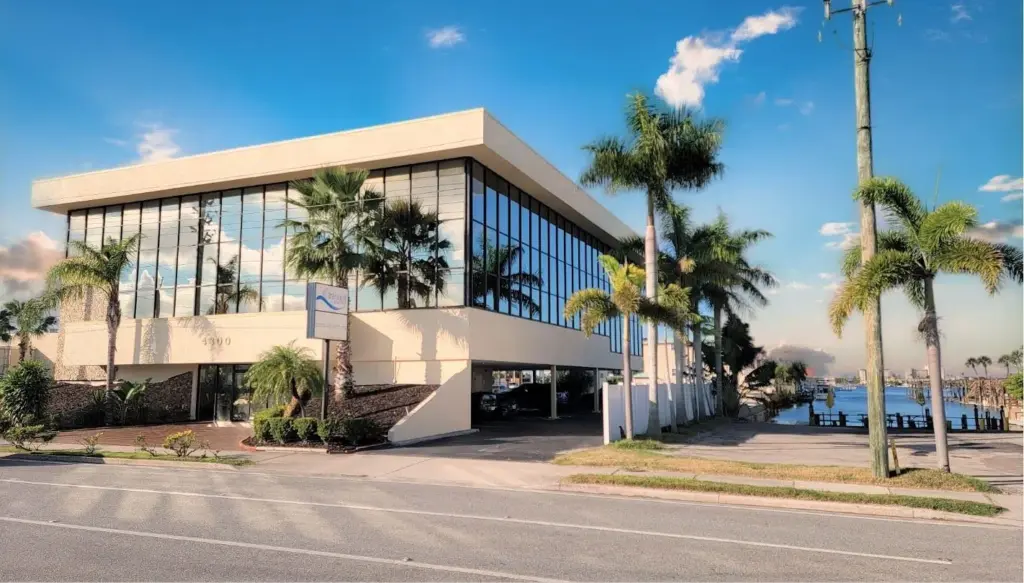
Have you been grappling with endless depression, anxiety, or stress with no relief in sight? Have these feelings evolved or stemmed from a substance use disorder? Have you tried to seek help but have not known where to begin?
You are not the only Floridian to feel this way. In the 2023 Community Health Assessment, 41% of Pinellas County residents responded that mental health and substance use disorders are the most pressing health concern that needs to be addressed. Tranquil Shores works within our communities to provide resources and a private place to heal from mental distress or substance use. One of the key therapies we offer in our treatment program is dialectical behavior therapy. It has proven beneficial in treating a variety of mental health conditions including personality disorders and substance use disorders. Let’s explore DBT and the techniques behind it.
Our clinical team of addiction experts takes advantage of treatment techniques that promote your overall well-being. Collectively, we refer to these techniques and processes as the Integrative Recovery Model (IRM). IRM is an effective tool in drug and alcohol use treatment, and our counselors put it to use in our calming beachfront facility. Some of our integrative model recovery methods include:
Dialectical behavior therapy – often referred to as DBT – is a specific type of talk therapy. Originally, DBT was utilized to treat borderline personality disorder and disorders where strong emotional experiences were present. However, many therapists found it was a successful technique in other mental health conditions, including substance use disorders.
DBT is centralized around the idea of acceptance. The goal is for the person to see and recognize their behaviors and lives as reality, and also address negative or unhealthy behaviors and change them. By understanding emotions can contradict each other and learning how to not let them take complete control, the person is able to create positive behavioral changes.
At Tranquil Shores, we utilize DBT for treating both substance use disorders and co-occurring mental health conditions. Our dedicated team will work with you to discover what coping skills work for you, and help you address emotions that are influencing your life. You will meet with your therapists at least twice per week while receiving treatment at Tranquil Shores.
In all we do, we will put forth our personal and professional best, providing the highest quality of care of which we are capable.
In all we do, we give thanks for the gift of life and all of its opportunities; we will find the true meaning of all of our blessings.
In all of our affairs, we will add meaning and purpose to the lives of our clients, their families, the community, and each other.
We will encourage and value the contributions of each person, and make each feel supported, reassured, and empowered.
In serving our clients, their families, the community, and each other, we will honor the individuality of each person.
In all our interactions we will build trust while being truthful, empathetic, and consistent.
At Tranquil Shores, we believe in using evidence-based therapy techniques to address the root causes of addiction and co-occurring mental health conditions. Dialectical behavioral therapy accomplishes this through acceptance and change of focus. Some practices of DBT include:
Mindfulness – improves the focus of being present.
Distress tolerance – practicing reacting to distress with less intensity more often.
Emotion regulation – recognizing emotions as they come and working to regulate and control them.
Interpersonal effectiveness – practicing getting the most out of social interactions.
Tranquil Shores has a full staff of qualified therapists to work with each individual on these techniques and provide healing. Unlike other facilities, we keep our client-to-therapist ratio low, at 3:1. This ensures each person who comes through our doors receives the individual attention they deserve.
As we mentioned above, the four main techniques of DBT are mindfulness, distress tolerance, emotion regulation, and interpersonal effectiveness.




LegitScript certification demonstrates that Tranquil Shores complies with LegitScript’s certification standards, which help to ensure transparency and compliance with applicable laws and regulations.

Short & long-term care: Both treatment options are available at our day & night Tampa Bay facility. The length of stay depends on your recovery process but it is typically 30-90 days.

Multiple therapy settings: Group, one-on-one, and family therapy are all very important in treating an individual recovering from addiction. At Tranquil Shores we offer more one on one and facetime with doctors and psychiatrists than the majority of other programs.

Day & night rehabilitation programs: Undergo detox, therapy, and aftercare after our staff creates an individualized program addressing your needs based on an initial assessment.

Aftercare services: Receive guidance and strategies for success in preventing relapse, as well as support as you transition back to your home environment.
DBT is not a “quick fix,” and it will take work and practice to master the techniques. You can expect to learn the core techniques while in treatment, but it will be up to you to integrate them into your everyday life. DBT is centered around emotions and reactions, and you can expect to dive deep into your feelings and how they channel into the way you respond to situations. Because this therapy is complex, it is best to continue dialectical behavioral therapy even after initial treatment is completed.
Dialectical behavioral therapy was developed from cognitive behavioral therapy (CBT) practices. However, there are some differences between the two. While both are a form of talk therapy, CBT is more change-focused. It shares a similar processing of negative thought patterns as DBT, but CBT works to change those thoughts and behaviors, whereas DBT works to accept them and change the reaction. CBT is based on thoughts and behaviors causing emotions, whereas DBT is based on emotions causing thoughts and behaviors. Both therapies are beneficial for treating substance use disorders and mental health conditions, which is why Tranquil Shores offers both and works with each client to see which approach works best for them individually.
DBT has many benefits in treating substance use disorders and mental health conditions. Emotions can drive behaviors negatively, especially when the person has no coping skills to manage them. It can be easy to turn to substances to try and stop feeling the way they do, and it does not matter if the person has a mental health condition or not. With the help of DBT, the person is able to address emotions and change the way they react in a healthy way – without substances. Through the development of coping skills and understanding the way the mind works in situations, healing is possible and the person can thrive in recovery. We have seen it through our clients here at Tranquil Shores by utilizing dialectical behavioral therapy as one of our core treatments.
As one of the most trusted alcohol rehab centers in Florida, the majority of our patients come from Tampa, St. Petersburg, and the surrounding area, but we accept clients from across the country.
There are many ways to approach substance use disorder treatment, but not every method will work for each individual. At Tranquil Shores, we are proud to offer a variety of therapy options including dialectical behavioral therapy. This evidence-based practice has helped many discover their success in recovery, and our qualified and compassionate team is here to help you understand where your addiction stemmed from. You don’t have to keep trying to manage emotional instability and substance use alone, we are here for you right now. All you have to do is take the first step.
Tranquil Shores is a beachfront rehab center located in beautiful Pinellas County, Florida. Our team of experts is beyond qualified to provide DBT and other therapies that promote a healthy and holistic recovery from substance use disorders and co-occurring mental health conditions. We take the guesswork out of treatment, providing private condos for housing and allowing you to keep your electronic devices working while in our program. Call us today at 727-391-7001 for the peaceful and private treatment you deserve.
As one of the most trusted alcohol rehab centers in Florida, the majority of our patients come from Tampa, St. Petersburg, and the surrounding area, but we accept clients from across the country.

Tranquil Shores’ Madeira Beach facility has a bridge leading down to the beach, providing a relaxing vacation-like feel and beautiful scenery. Our living quarters and amenities, such as our basketball and tennis courts, are all close by, creating convenience in getting to and from activities and treatments.
4300 Duhme Road
Madeira Beach, FL 33708
727-391-7001




Admission begins as soon as you make that initial phone call and speak with one of our admission specialists, who are available 24/7. During this call, you’re encouraged to ask any questions or express any concerns you may have about the admission process. Once you arrive at our facility, you will immediately start working with a licensed addiction therapist who will help you create your personalized treatment plan. This same therapist will be with you every step during your stay at Tranquil Shores.
Your comfort is one of our top priorities here at Tranquil Shores, and optimal comfort couldn’t be obtained without some aspects of normal life. We provide detailed lists of what you’ll need to bring along, what you’re allowed to bring, and what isn’t allowed. Necessities such as proof of ID and insurance information will be needed. Common toiletries, clothing, and even personal electronics are welcome, but not without certain restrictions, such as no provocative clothing, no E-cigarettes, and no cameras. We offer detailed guidance on how to best prepare for alcohol rehab.
Arrangements with work will have to be made. Your leave of absence may be unpaid, but The Americans with Disabilities Act (ADA) and the Family and Medical Leave Act (FMLA) both secure your right to healthcare without experiencing discrimination or losing your job. If you are an eligible employee under FMLA, you are entitled to 12 weeks of leave in certain cases. One of these qualifying scenarios is if you experience a serious health condition, which includes addiction. Our trained professionals can also help submit the necessary paperwork to your Human Resources department.
We also provide outlets that allow work to be done during your stay at our facility. We understand life does not stop when you attend alcohol rehab, which is why we allow personal electronics and the opportunity to continue work. Private workspaces, a computer, printer, fax access, and accommodations for conference meetings for executives are all available.
We accept insurance on an out-of-network basis. This means that you will typically have a higher self-pay responsibility than an in-network provider. You will pay your deductible and out-of-pocket before we can bill your insurance. If your insurance does not have out-of-network benefits we cannot bill your insurance and you will pay the private pay rate. We can work with you on the financial side and/or refer you to another facility that may be within your network. There are no surprises with us, and you will know what you are responsible for before you are admitted. Don’t let finances be a barrier to treatment. Call us and we can walk you through it.
Quick Links
© 2024 All Rights Reserved.